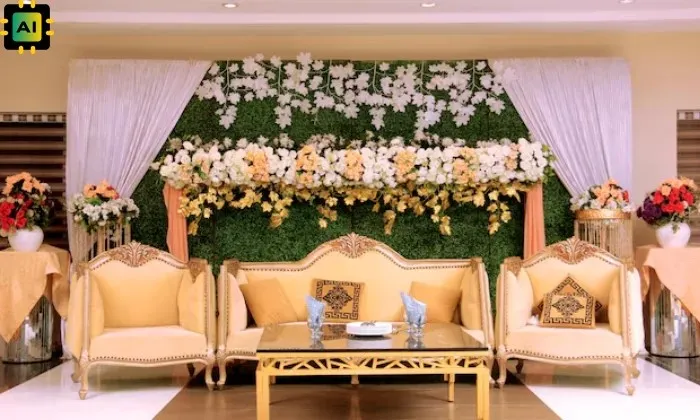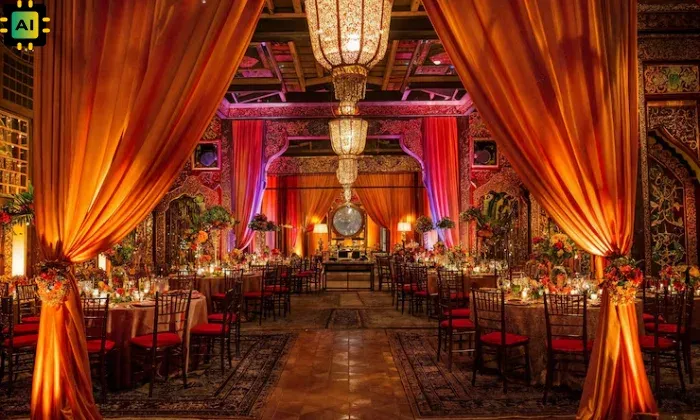Indian States and Their Traditional Wedding Dresses
 Wedding Fashion & Style
Wedding Fashion & StyleIndian States and Their
Traditional Wedding Dresses: A Journey Through Culture and Elegance
India,
a rustic with different traditions and active tradition, is world famous for
its weddings. Indian weddings aren't simply ceremonies; They are a awesome
festival for love, circle of relatives, background and customs that have been
followed for centuries. Among all the factors that make Indian marriage
unforgettable, the conventional wedding get dressed of every nation appears as
a symbol of popularity and delight.
Each
nation in India has its very own particular wedding ceremony get dressed, which
has history, geography, climate and cultural effects. These agencies aren't
pretty much aesthetics; They have religious, emotional and cultural
significance. In this weblog, we can dive into the attractive global of Indian
states and their traditional wedding clothes, apprehend that these garments
mean something, they mean and how they replicate the prosperity of Indian
historical past.
Why traditional wedding
ceremony clothes are wished
Traditional
wedding ceremony clothes aren't simply garments; They are tales woven in
garments. They constitute the values, rituals and aesthetics of society. In a
world in which modernization and globalization regularly blur cultural
identification, the marriage get dressed acts as a bridge connecting people
with their roots.
Why
conventional wedding clothes are needed right here:
Cultural
identity: Every groom and bride who has traditional dress is a high-quality
representative in their society.
Symbolism:
From shades to motifs, each element has a symbolic that means - pink for
prosperity, gold for wealth, white for purity and so on.
Ritual
importance: Wedding attire regularly healthy religious customs and rituals
accomplished in ceremonies.
Inheritance
protection: Using ancestors or traditional patterns is saved in the Live
Century -vintage exercise alive.
Emotional
courting: Traditional dress creates indifference, and reminds families of
generations in front of them.
Indian
state and their traditional wedding dresses
1. Punjab
Punjabi
bridges often have heavy embroidered lehenga-cholis or salwar-chemis in light
colors of red or pink, with complex puffed work. The groom traditionally has
Kurta pyjamas with a sherwani and a colored turban. "Kaliyar"
(jewelry hanging on bracelets) symbolizes blessings for prosperity.
2. Rajasthan
Rajasthani
Bride Mirror-Choli is blended with mirror work and Lehria or Bandrani Design.
The famous "Odhneys" (Veil) with strong embroidery symbolizes grace.
The groom is wearing a vibrant angaraka with safa (turban), which is often
decorated with jewelry and wings.
3. Gujarat
Gujarati
bridges are wearing unique panters, which is a combination of red and white,
which is a symbol of purity and happiness. The groom is wearing a dhoti-curved,
or Sherwani is combined with a turban with a turban.
4. Maharashtra
The
Maharashtrian brides have a traditional patony saree in light colors such as
green or yellow, wrapped in a separate Naugi (NAU-Yard) style. They have access
to "mundavalya" (a string of pearls tied over the forehead). The
groom is wearing a Dhoti-Vowa with a feta (turban).
5. west -bengal
Bengalic
brides are recognized by its red and white banarasi -searee adorned with Golden
Zari. They are wearing a unique head pointer, called "Topor", which
comes out of Sola (Peeth). The groom carries dhoti and kurtas in silk or tasar
with a matching peaks.
6. Odisha
Odia
Brides prefers bright bomb kai or sambalpuri sarees in red, yellow or orange
colors. The groom is wearing a traditional dhoti with a Kurta or Sherwani,
often with a turban.
7. Assam
The
assamic bride makes eats in the Mekhala Chador made of silk, especially in the
famous Muga -Silk, cream and golden colors. The groom carries a dhoti-village
with a dholang (a silk cloth wrapped around the body).
9. Tamil Nadu
Tamil
Bridges shines in Kanjavaram Sareee with active colorations and complex Zari
activists. The groom is a symbol of simplicity and style, the groom contains a
dhoti (dhoti) and angavastram.
10. Karnataka
The
Kannadiga bride wears Mysore Silk Sarees in red and gold colors. The groom is
sporting a silk with a kurta of Panch (Dhoti) or angavastram.
11. Andhra Pradesh and
Telangana
The brides have poachampali or gadwal in wealthy colorings close to the brides, and beautify lots. The groom is carrying a Dhoti-Kurta or Sherwani with silk stalls.
12. UTTAR Pradesh
The
brides have crimson or pink-brown lehenga-cholis, that's embroidered with the
basis's paintings, while the groom has carried a embroidered sherwani with
churidar and turban.
13. Bihar
Bihari
bridges decide on pink or pink -purple -Bansi Sarees with complex Zari
paintings. The groom is wearing a dhoti-karnna or sherwani, normally
complemented with a turban.
14. Madhya Pradesh
The
bride is carrying lehenga-choli or sarer with strong embroidery, frequently in
brilliant colors. The groom chooses Sherwani or Dhoti-Va with a Safa (turban).
15. Himachal Pradesh
The
Himachali bride wore Ghaga-Choli with a colourful scarf and a complex-designed
head recommendations known as "Ride". The groom carried the curved
gray wool with a carbon cap.
16. Jammu and Kashmir
The
Kashmiri bride carried a luxurious boat with heavy embroidery, known as
"earnings". The groom has a comparable throat with a turban.
17. Goa
The
Goan Catholic Bride regularly has elegant white garments with the veil, while
the Hindu bride wears Sarees in a Banbi or neo-vari-style. The groom wears a
western suit or Dhoti indicators.
18. Nagaland
The
naga bride is sporting a traditional dress, made with a hand-crafted shawl,
often vibrant and pearls. The groom takes the shawl with a conventional
warrior.
The importance of
traditional wedding dresses
Spiritual
symbolism: Each
dress is chosen according to the Customs Service that blesses the couple with
prosperity and long life.
Cultural
heritage: The
wedding dress preserves art forms such as weaving, embroidery and staining, and
keeps alive the objects.
Emotional
values: Families
often pass wedding or jewels like a sky.
Social
pride: Having
traditional dress strengthens social conditions and performs diversity.
10 Frequently requested
questions
Q1. Why do most Indian
brides have red?
Red is a image of
prosperity, fertility and marital happiness within the Red Indian lifestyle,
that's the bride's maximum fake shade shade.
Q2. Does the Indian groom
need to put on a conventional get dressed?
Not required, however
traditional dress is advocated while it fits rituals and represents cultural
history.
Q3. Can the bride select
colorations apart from Lal?
Yes, many modern-day
grooms choose pink, gold, radish-bron or pastel colorations based totally on
private choice and social series.
Q4. Why are wedding
ceremony dresses one after the other in the kingdom?
The substances are
one-of-a-kind due to nearby weather, textiles, religious practices and cultural
outcomes for every state.
Q5. What is the
importance of jewelry in Indian weddings?
The rings is a image of
wealth, status and blessings. It is also considered to shield brides from
negative energy.
Q6. Are conventional
companies hand-crafted?
There are many
hand-crafted, which includes skilled craftsmen, who use weaving, embroidery and
coloration strategies for generations.
Q7. How long does it take
to put together a traditional wedding get dressed?
It may additionally take
weeks or months, in particular as a banarasia or morning for Handwan Sarees.
Q8. Use groom -specific
hues?
Yes, the groom often
makes use of gold, cream, beige or pink shades, which symbolizes prosperity and
happiness.
Q9. Are these garments
just performed during weddings?
Most are specific to
weddings, although a few creatures which includes patni or banarasi are also
all for different happiness events.
Q10. How is traditional
dress appropriate for current tendencies?
Designers integrate
conventional elements with present day patterns -reducing for carcasses and
fusion cuts to appeal to fashionable joints.
Also Read:
Best Bridal Hairstyle Ideas for Indian Wedding: A Complete Guide for the
Modern Bride
South Indian
Weddings: A Complete Guide On The Rituals And Traditions
How To Avoid
Overspending On Food Catering For Your Wedding
Wedding Hair and
Makeup FAQs: Everything Brides Need to Know
Instagram:- www.instagram.com/dreamweddinghub
Blog Category
Popular Blogs
-min.webp)
Top Bridal Entry Ideas: Unique and Memorable Ways for Indian Brides
5 Jul, 2024

10 Unique Couple Outfit Colors for Sangeet Ceremony
2 Aug, 2025

Marriage Home in Alwar: Dream Wedding Hub
4 Nov, 2025
.webp)
Best Wedding Venues in Alwar : Dream Wedding Hub
25 Oct, 2025

Wedding Venue in Bassi (Jaipur) : Dream Wedding Hub
23 Oct, 2025
.webp)
Best Wedding Venues in Rajgarh : Dream Wedding Hub
31 Oct, 2025

Best Wedding Venues In neemrana (alwar)
31 Oct, 2025

Wedding Venue in Malviya Nagar (Jaipur): Dream Wedding Hub
23 Oct, 2025

7 Most Common Mistakes Made by Wedding Decorators and How to Avoid Them
22 Sep, 2025
 (1).webp)
Best Wedding Venues in Alwar
25 Oct, 2025